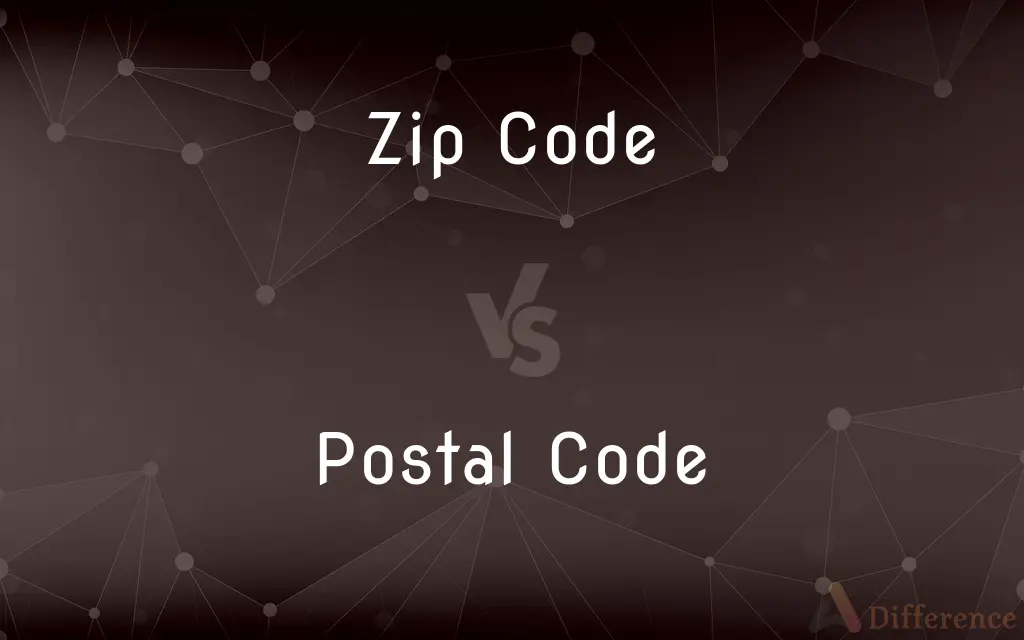Zip Code vs. Postal Code — What's the Difference?
By Tayyaba Rehman & Fiza Rafique — Published on October 17, 2023
Zip Code: Specific to the U.S., representing delivery areas. Postal Code: A generic term for addressing codes worldwide.

Difference Between Zip Code and Postal Code
Table of Contents
ADVERTISEMENT
Key Differences
A Zip Code, primarily used in the U.S., stands for "Zone Improvement Plan." It's a system the United States Postal Service introduced in 1963. The primary aim of a Zip Code is to make mail traveling more efficient and effective. With the Zip Code system, USPS could easily identify the destination of a piece of mail and its route.
On the other hand, Postal Code is a more generic term used globally to describe a series of letters and/or digits that are appended to a postal address to assist in sorting mail. Different countries have their unique postal code systems, and they might use different names for it. For instance, in Canada, it's termed as "postal code," but in India, it's called a "PIN" or "Postal Index Number."
When it comes to the format, Zip Codes typically consist of five digits, though an extended version, known as ZIP+4, includes an extra four digits separated by a hyphen to provide additional location information. This level of granularity allows for more specific mail sorting within the U.S.
Conversely, Postal Codes vary in format from country to country. Some might be alphanumeric, like Canada's, while others might be strictly numeric. The length and format depend on the nation's postal system. The primary goal, similar to the Zip Code, is to aid in sorting mail efficiently.
In essence, while Zip Code is a term specifically related to the U.S. postal system, Postal Code is a universal term that encompasses all addressing code systems across the globe, including the U.S. Zip Code.
ADVERTISEMENT
Comparison Chart
Country of Use
United States
Worldwide
Meaning
Zone Improvement Plan
Addressing code used for sorting mail
Format
Typically 5 digits, can be extended to 9
Varies, can be alphanumeric or numeric
Specificity
Specific to U.S. regions
Generic term for mail sorting codes globally
Example of Variation in Naming
ZIP+4 in the U.S.
PIN in India, Postcode in the UK
Compare with Definitions
Zip Code
The "Zone Improvement Plan" code.
The Zip Code helps the USPS deliver mail efficiently.
Postal Code
A series of letters/digits for sorting mail.
Every region has its unique Postal Code.
Zip Code
The U.S. system for mail sorting.
The package is headed to the 10001 Zip Code in New York.
Postal Code
Assists in identifying delivery locations.
Write the Postal Code clearly on the package.
Zip Code
A five-digit number representing U.S. delivery areas.
Her Zip Code is 90210.
Postal Code
Represents postal regions in various countries.
In Canada, the Postal Code is alphanumeric.
Zip Code
A U.S. postal addressing code.
Ensure you have the correct Zip Code before mailing.
Postal Code
A universal term for addressing codes.
The Postal Code ensures mail reaches its destination.
Zip Code
An addressing element for U.S. regions.
Different states have different Zip Code ranges.
Postal Code
A global system for mail addressing.
The Postal Code varies from country to country.
Zip Code
To affix a zip code to (an address or a letter).
Common Curiosities
What does Zip Code stand for?
Zip Code stands for "Zone Improvement Plan."
Is Postal Code used worldwide?
Yes, Postal Code is a generic term used for addressing codes worldwide.
Are Zip Code and Postal Code the same?
No, Zip Code is specific to the U.S., while Postal Code is a global term for mail sorting codes.
How many digits are in a standard U.S. Zip Code?
A standard U.S. Zip Code has five digits.
Can a Zip Code be alphanumeric?
No, U.S. Zip Codes are numeric, but Postal Codes in countries like Canada are alphanumeric.
Why do we use Postal Codes?
Postal Codes help in efficiently sorting and delivering mail.
What's a ZIP+4 Code?
ZIP+4 is an extended version of the Zip Code with an additional four digits for more specific locations.
Can a country have multiple Postal Code formats?
Typically, each country maintains a consistent Postal Code format, but the format varies from country to country.
When was the Zip Code introduced?
The Zip Code was introduced in the U.S. in 1963.
Does every address have a Postal Code?
Most addresses in populated areas worldwide have a Postal Code, but there might be exceptions in remote areas.
Do all countries use the term Postal Code?
No, different countries might use terms like "postcode," "PIN," or others.
How is a Zip Code different from a Postal Code in terms of use?
Zip Code is used specifically in the U.S., while Postal Code is a term used globally.
Is a Zip Code always five digits?
Typically, yes, but the ZIP+4 format has nine digits.
Do Postal Codes only contain numbers?
No, Postal Codes can be alphanumeric or purely numeric, depending on the country's system.
What's the main purpose of a Zip Code?
The main purpose of a Zip Code is to make mail traveling in the U.S. more efficient and effective.
Share Your Discovery

Previous Comparison
TFT vs. LCD
Next Comparison
American English vs. British EnglishAuthor Spotlight
Written by
Tayyaba RehmanTayyaba Rehman is a distinguished writer, currently serving as a primary contributor to askdifference.com. As a researcher in semantics and etymology, Tayyaba's passion for the complexity of languages and their distinctions has found a perfect home on the platform. Tayyaba delves into the intricacies of language, distinguishing between commonly confused words and phrases, thereby providing clarity for readers worldwide.
Co-written by
Fiza RafiqueFiza Rafique is a skilled content writer at AskDifference.com, where she meticulously refines and enhances written pieces. Drawing from her vast editorial expertise, Fiza ensures clarity, accuracy, and precision in every article. Passionate about language, she continually seeks to elevate the quality of content for readers worldwide.
















































